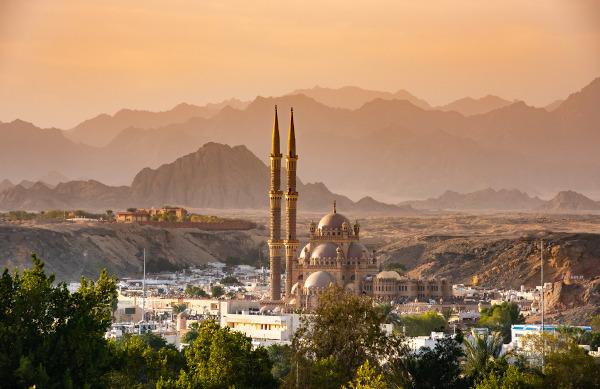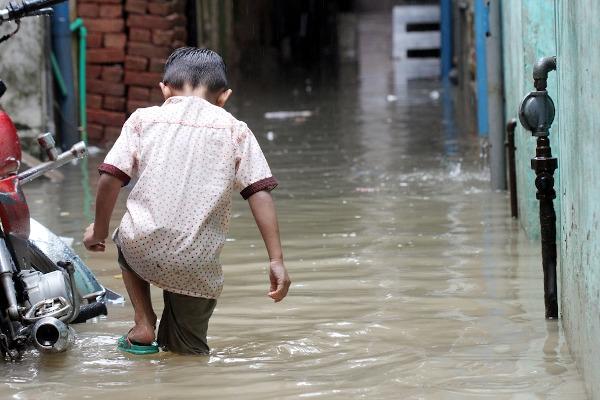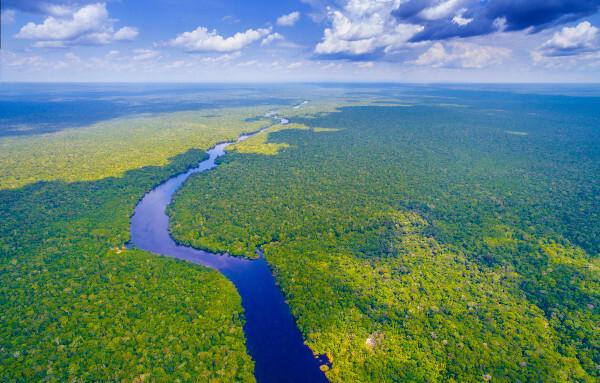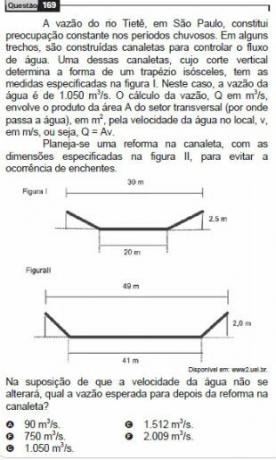A COP 27 is the 27th session of the Conference of the Parties to the United Nations Framework Convention on Climate Change (UNFCCC). The COP takes place every year since 1995, and its 2022 edition was held in the city of Sharm El-Sheikh, in Egypt. Participated in COP 27 all countries that ratified the UNFCCC, which now total 198 territories.
Inserted in a context of aggravation of the effects of climate changes, COP 27 was important for the reaffirmation and expansion of the goals established in previous meetings and for guaranteeing the fulfillment of urgent actions on the climate, thus trying to reduce the negative impacts of climate change and ensure a more sustainable future for future generations.
Read too: Global Warming—What Can Earth's Increase in Temperature Cause?
Topics of this article
- 1 - Summary about COP 27
- 2 - What is COP 27?
- 3 - Purpose of COP 27
- 4 - Matters discussed at COP 27
- 5 - What is the importance of COP 27?
- 6 - Which countries are part of COP 27?
- 7 - Brazil at the COP
- 8 - Origin of the COP
Summary about COP 27
COP 27 is the 27th annual meeting of the Conference of the Parties to the United Nations Framework Convention on Climate Change (UNFCCC).
It was held in November 2022 in the city of Sharm El-Sheikh, Egypt.
The main objective of COP 27 was the reiteration and fulfillment of previously established commitments and targets for reducing emissions of greenhouse gases established in previous sessions, aimed at accelerating action on climate change.
Numerous discussions were promoted on important topics for climate action, such as adaptation and resilience measures, reduction of logging, energy transition, adoption of sustainable practices by agribusiness and assistance to less developed countries.
The signatory countries of the UNFCCC, created in the context of the ANDCO-92 and currently ratified by 198 countries.
COP meetings are annual and have been held since 1995.
The participation of Brazil was fundamental in the discussions at COP 27, with the country assuming an important role in the fight against climate change and in the preservation of the environment, with emphasis on amazon.
Do not stop now... There's more after the publicity ;)
What is COP 27?
COP 27 is what it's called 27th meeting Yearly of the Conference of the Parties to the United Nations Framework Convention on Climate Change (UNFCCC, its acronym in English).
The meeting was scheduled to take place in the year 2021, but was transferred to the following year, in due to changes in the calendar of meetings resulting from the limitations and risks imposed by the pandemic of Covid-19. With that, COP 27 took place between the 6th and 18th of November 2022 in the city of Sharm El-Sheikh, located on the Sinai Peninsula, in Egypt.

Purpose of COP 27
COP 27 took place amid a scenario of worsening climate change shown by the latest Intergovernmental Panel report on Climate Change, the IPCC, which indicates the need for quick action so that there are no even more severe and irreversible impacts over time. environment and to human beings.
Thus, the main objective of COP 27 is to international cooperation to meet established goals in previous sessions, which aim to accelerate global actions on climate and reduce greenhouse gas emissions. greenhouse effect In the atmosphere. It is expected to limit global warming in the coming years to 2 °C, with the main goal, however, being limited to a level of up to 1.5 °C.
Between the specific objectives of the 27th session of the COP, we can highlight the following:
Implementation of the Glasgow Climate Pact, a document resulting from COP 26 that took place in 2021. One of the requirements of this pact is the revision of the emission reduction targets for carbon that must be fulfilled by 2030 by the signatory countries.
Improving actions on adapting to climate change and mitigating its effects. One example is the implementation of sustainable food systems, a goal to which Brazil has committed itself, with a view to directly helping other nations.
Follow-up of financial agreements and financing commitments for underdeveloped countries and under development to ensure greater transparency in meeting climate action targets.
Ensure the joint work of governments, the market and civil society in the implementation of new solutions and also in practice to be able to reduce the impacts of climate change in the medium and long term term. It is also important that these solutions and measures help underdeveloped countries in particular.
Check it out on our podcast: Sustainability, environmental degradation and human responsibility
Issues discussed at COP 27
COP 27 promoted thematic discussions on several subjects related to climate emergency and strategies to mitigate its effects in the near future, taking into account the objectives and targets established in the Paris Agreement, mainly.
We list below some of the issues that were addressed during the meetings and panels at COP 27, especially considering those in which the Brazilian commission and the country's representatives were gifts.
deforestation in brazilian biomes, with emphasis on the Amazon.
Sustainable agriculture and adoption of sustainable practices in the agribusiness.
Ensuring food security, especially in less developed countries.
Carbon credits market and the guarantee of a greener future.
Adoption of a cleaner and more sustainable energy matrix, the so-called energy transition.
Sustainable management of sources of potable water and ways to ensure broad access to this resource, with strategies to combat shortages and droughts.
Impacts of climate change and the pollution on biodiversity in all ecosystems, land and sea, and the challenges and strategies to stop further species degradation.
Gender equality and women's participation in adapting to climate change.
Adaptation and resilience to the transformations promoted by climate change.
Partnerships between countries and between companies in the elaboration and rapid execution of policies and action plans aimed at reduction of carbon emissions and other measures that help to reduce the impacts of changes weather.
What is the importance of COP 27?

As we have seen, COP 27 takes place at a time of great international instability, considering the war between russia and ukraine, and worsening perceived climate change through extreme weather events. Recent examples abound, such as the floods at the Pakistan, in the second half of 2022, due to monsoon rains, with volumes much higher than expected, which left approximately a third of the country flooded|1| and caused more than 1200 fatalities, 30% of which were children and adolescents |2|.
In this sense, COP 27 is of great importance for the renewal of goalsestablished in previous sessions and, above all, to guarantee compliance with the agreements and partnerships that have been made before to accelerate climate action and ensure a sustainable future for generations to come.
Read too: urban environmental problems
Which countries are part of COP 27?
COP 27, like previous meetings, had the participation of signatory countries from the United Nations Framework Convention on Climate Change, United Nations treaty resulting from the United Nations Conference on Environment and Development held in city of Rio de Janeiro in 1992, better known as ECO-92.
Therefore, the Conference of the Parties currently has 198 countries and territories, which includes all members of the UN.
Brazil at the COP

Brazil is one of the countries that ratified the treaty known as the UNFCCC and, for that reason, is one of the components of the Conference of the Parties (COP). The participation of the Brazilian delegation, which today is made up of important sectors of our civil society, such as social movements, traditional peoples, environmentalists and researchers, representatives of companies and state and federal governments, is extremely important for the advancement of the environmental and climate agenda in the country.
In addition, the Brazil today occupies a central position in discussions about the environment, due to the role of the Amazon in the world climate and the environmental problems identified in the forest, such as burned and worrying deforestation rates.
The country hosted one of the biggest climate events held by the United Nations, ECO-92, when the UNFCCC and the deliberative body of the COP emerged. In the meetings that followed, Brazil adhered to the main established agreements and treaties, as was the case of the Kyoto Protocol, signed in 1998 and ratified in 2002, although there were no specific targets for Brazil in that document, since it is a developing country, and also the Paris Agreement, signed in 2016.
At COP 16, held in 2010, Brazil announced the regulation of its National Policy on Climate Change and signed an important commitment to reduce CO emissions2 until the year 2020. Three years later, the country actively participated in discussions on the carbon market, having been target of concern due to the oil exploration of the Pre-salt It's from deforestation in the Amazon|3|. At COP 26, the country returned to a goal that had already been established previously, which is to reduce greenhouse gas emissions by up to 50% by 2030.
A COP 27 represents a milestone in Brazilian environmental and climate policy, in view of the return of civil society participation in the discussions and the departure of a large part of the members of the new government elected in the year 2022, which will be responsible for implementing the decision-making agreements in the next four years. Among the commitments assumed are the reduction of gas emissions by up to 50% by the year 2028 and deforestation zero, reiterating the importance of immediate actions to mitigate the effects of global warming and changes weather.
Origin of COP
COP is the acronym for the Conference of the Parties, the main deliberative body of the UNFCCC. This conference emerged in the context of ECO-92, which was held in the city of Rio de Janeiro and represented a milestone in environmental and climate discussions on an international scale. All UNFCCC signatory countries participate in the COP meetings, one of which is Brazil.
A first COP session was held in 1995, one year after ratification of the UNFCCC. The meeting took place in the German capital, Berlin, and had as one of its objectives the establishment of targets for reducing the emission of greenhouse gases for the developed countries. Since then, COP sessions have been held annually, with the exception of COP 26, which was postponed by one year due to the covid-19 pandemic.
Grades
|1| ESSAY. Rains leave a third of Pakistan with floods and more than 1,000 dead. G1, 31 Aug. 2022. Available here.
|2| ESSAY. Floods in Pakistan leave 16 million children at risk. UN News, 02 Sept. 2022. Available here.
|3| THUSWOHL, Mauricio. COP-19 makes little headway; Brazil is under pressure from deforestation and pre-salt. Reporter Brazil, 25 Nov. 2013. Available here.
By Paloma Guitarrara
Geography Teacher
What is the Paris Agreement? Understand the agreement signed by 195 countries to reduce the advance of global warming. See also the countries that did not sign the agreement.
Understand more about environmental conferences. The following text will help you understand what they are, how they came about and why environmental conferences are necessary, which bring together representatives of several countries to discuss the environmental impacts and to establish agreements aimed at sustainability.
Access our text to understand what ECO-92 was and its importance for environmental discussions. Find out what were the main results of this conference.
What do you know about climate change? Understand the causes, consequences and the relationship with environmental conferences, the greenhouse effect and global warming.
The growing concern about global warming resulted in measures such as those provided for in the Kyoto Protocol. Click here and understand what this important agreement was.
Indonesia is suffering once again the consequences of a magnitude 5.6 earthquake that hit it this Monday, November 21st.



